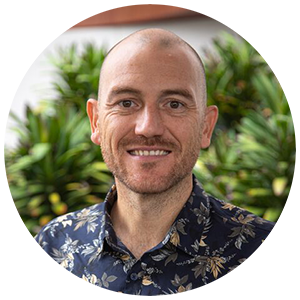As I teenager, I loved the Hitchhiker’s Guide to the Galaxy book series. They were funny, eccentric and, as it turns out, prophetic. One of the crazy ideas in the book was the Babel Fish—a small fish that you placed inside your ear canal that would instantly translate any language so you could understand what any person (or alien creature) was saying. It transformed the galaxy!
Who’d have thought that just last week I used a similar feature on my phone to have a conversation with some new friends who are refugees from Ukraine. Technology is amazing.
Language That Confuses
The Babel Fish, of course, is named after the Tower of Babel (Genesis 11)—a place where humanity was judged by God for being full of pride and building a tower to ‘reach the heavens,’ and become God-like. The result was a scattering by God. He confused people with many languages and spread them all over the land so their pride might never bring them to this place again. It was an act of mercy, but it was only the beginning of the story.
The narrative reaches its full arc on the Day of Pentecost when the Holy Spirit is poured out on God’s people and the Church is born!
‘Everyone present was filled with the Holy Spirit and began speaking in other languages.’ (Acts 2:4)
Language That Includes
This crazy, and chaotic day is the fulfillment of a promise and the reversal of the Babel curse. Everyone hears the good news in their own language regardless of where they’re from or what their cultural heritage is. In the Spirit, humanity finds its hope and unity. What God started in sending Jesus is complete in the Church–God dwelling with his people!
What I find most encouraging is that humanity no longer need to struggle to become God-like. Instead, in this great reversal, God has become human-like. The Church becomes the instrument through which God’s Kingdom is proclaimed and demonstrated to a hurting and broken world.
Theologian N.T. Wright puts it this way:
‘Our task as image-bearing, God-loving, Christ-shaped, Spirit-filled Christians, following Christ and shaping our world, is to announce redemption to a world that has discovered its fallenness, to announce healing to a world that has discovered its brokenness, to proclaim love and trust to a world that knows only exploitation, fear and suspicion.’ (N.T. Wright, The Challenge of Jesus)
An Uncontainable Kingdom
One of the great challenges the early church faced was how to live this out. We see the early Jesus-followers continually confronted by the unpredictable acts of the Holy Spirit. Every time believers found a comfortable box to put God in, the Spirit broke down the sides.
Whether it be the greed and deceit of Ananias and Sapphira, the conflict over the support and care of widows, or the conflict with the Jewish religious leaders, we see the church constantly trying to make sense of what being a Kingdom-people looked like.
Perhaps the most challenging event for the culturally Jewish believers was when the Spirit was poured out on Gentiles! We don’t quite get it today, but this was truly scandalous! It challenged the core of the disciples’ belief system. It had them facing the question, ‘What does it mean that God chooses to dwell with these “outsiders” in just the same way as us “insiders?”’
Could it be that all people were equal? That all people were image bearers of God? That worth and dignity didn’t depend on where they were born, their religious background, their gender or their economic status?
Paul certainly thought so when he wrote to the Colossians.
In this new life, it doesn’t matter if you are a Jew or a Gentile, circumcised or uncircumcised, barbaric, uncivilized, slave, or free. Christ is all that matters, and he lives in all of us.’ (Col 3:11)
A Reminder At Pentecost
This is still challenging for us today. Whether in our churches, or as we engage with neighbours, refugees, First Nations people or the most vulnerable people overseas–the question is real: ‘What does it mean for us to be spirit-filled believers who see everyone as made in the image of God, regardless of their background, language or gender?’
As we celebrate Pentecost this year we should rejoice in the sending of the Holy Spirit. It’s the birthday of the church and should be one of the most celebrated days in our worship gatherings. It’s also the chance to remind ourselves that we are Spirit-filled people who are commissioned by God to bring his Kingdom rule to the world through acts of service, love and generosity. In a broken and hurting world, Pentecost equips us to be God’s agents of hope. What a privilege!



 Ed Devine
Ed Devine

 Baptist World Aid
Baptist World Aid